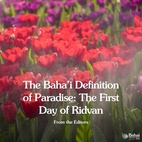The views expressed in our content reflect individual perspectives and do not represent the official views of the Baha'i Faith.
For Baha’is, two practices are indispensable for spiritual growth: obligatory prayer and fasting. But what is so significant about them?
We have ordained obligatory prayer and fasting so that all may by these means draw nigh unto God, the Most Powerful, the Well-Beloved. – Baha’u’llah, The Importance of Obligatory Prayer and Fasting.
“… obligatory prayer and fasting produce awareness and awakening in man, and are conducive to his protection and preservation from tests.” – Abdu’l-Baha, Ibid.
The Baha’i teachings say that everyone has two natures: a higher nature and a lower nature.
Baha’u’llah wrote that we are like birds that have come down from the heights above to the Earth below, and become stuck in the mud of material desires. Because of this, we can lack an inclination towards the things of the spirit. Hence, we need some means of controlling the material desires that largely drive us. These desires can be egotistical, hateful, lustful and destructive. While we might know intellectually that certain desires are not pure or helpful, we can still have the temptation to pursue them. Our knowledge that they are negative is often not strong enough to stop us from fulfilling those cravings. That means we need to develop self-control—and the best way of doing this, according to the Baha’i teachings, is through fasting: “Verily, I say, fasting is the supreme remedy and the most great healing for the disease of self and passion.” – Baha’u’llah, Ibid.
When we fast, we temporarily deny ourselves the two most basic human needs: food and water. All of our survival instincts and sensual desires urge us to eat and drink. These desires are hard-wired into us, and have enabled us to continue to live on this planet through the ages. Working against these instincts is quite challenging—but very rewarding.
The first time I fasted I was scared senseless. I was petrified that I would faint. I was sure that I would not be able to go without food during the daytime, especially considering the fact that I am the kind of person who eats every few hours. But I did it. Now, every year during the Baha’i fasting period, I manage to succeed at not eating and drinking.
But most importantly, through doing this, I have learned that I have the capacity to control my actions. Even if desires arise within me, I have the choice and the power to deny them or pursue them. This vital skill can help us all when inhabiting the netherworld of the lower nature.
We are stuck here because we have a lower nature that attracts us to this material world, made more difficult by the fact that we are surrounded by other people, groups and institutions that are also driven by the lower nature and often actively promote purely material goals. So to resist conforming to this, we need to develop immense strength so that we do not become slaves to a lower cause. To this end, fasting and self-control are vital.
However, the spiritual path is not just a struggle to negate our lower natures. At the same time as we are being vigilant in not pursuing our corrupt desires, we are also trying to elevate our souls—which is why daily obligatory prayer is so important. Baha’is choose between saying one of three obligatory prayers each day:
The wisdom of obligatory prayer is this: That it causeth a connection between the servant and the True One, because at that time man with all his heart and soul turneth his face towards the Almighty, seeking His association and desiring His love and companionship. For a lover, there is no greater pleasure than to converse with his beloved, and for a seeker, there is no greater bounty than intimacy with the object of his desire. – Abdu’l-Baha, Ibid.
Prayer is a means to elevate the soul, done for the sake of God. It helps us rise above our lower nature. Through this kind of prayer we attain a higher spiritual station. Because prayer raises us above our lower selves, we are less attracted to the things of the world and more attracted to the glories of the spiritual world. When we become acquainted with the joys of the spirit, matter loses its hold on us.
If we eat a lot of sugar-rich foods, we become addicted to them. Not only that, because of the intensity of the taste, nothing tastes as good compared to something sweet. But if we slowly reduce sugar, we can become less addicted to that sensation. We start to develop a taste for the more subtle but pure flavors of natural foods. A mango becomes the epitome of deliciousness, and then one day the “plain” cucumber is packed with a flavour that we cannot resist. If someone offers us some candy, we will be disgusted at the thought. We realize that we need to summon less will-power to resist the urge to eat something sugary. We have developed a higher taste.
It is the same with the spirit:
Whosoever experienceth the holy ecstasy of worship will refuse to barter such an act or any praise of God for all that existeth in the world. – Baha’u’llah, Ibid.
Fasting and obligatory prayer are as two wings to man’s life. Blessed be the one who soareth with their aid in the heaven of the love of God, the Lord of all worlds. – Ibid.
Fasting is the sun shining on our path: through the intensity of its heat our desires are burnt away. Obligatory prayer is the moon: we can look directly at its luminous form and become drawn to it.

















Comments
Sign in or create an account
Continue with Facebookor